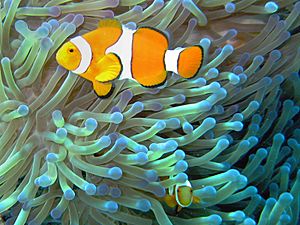Cooperation facts for kids

Cooperation means working or acting together. It can be simple, like things working side by side, or very complex, like how a human body functions or how a country's society works. Cooperation is the opposite of working alone or competing. Even computers can cooperate by sharing tasks and resources.
Many living things, including animals and plants, cooperate. They work with others from their own species or with different species. This is often called symbiosis or mutualism. When parts of a system cooperate, they create something much bigger and more complex than they could alone.
For example, tiny parts inside a cell work together to keep it alive. Cells cooperate to form complex multicellular organisms. Organisms cooperate to create food chains and ecosystems. People cooperate to form families, cities, and nations. Even atoms cooperate to make molecules. Understanding how cooperation happens is a big challenge in science.
Sometimes, cooperation is chosen freely. Other times, it might be forced or even happen by accident. People and groups can cooperate even if they don't have the same goals. You can see this in places like markets, families, schools, and workplaces.
Contents
Why Do Living Things Cooperate?
Cooperation is a process where different parts of a system work together. They achieve goals that benefit the whole system. Even if individual parts seem to act on their own, they combine to create something amazing.
Here are some examples of how different parts cooperate:
- The tiny parts inside a cell work together to keep it alive and healthy.
- Neurons (brain cells) cooperate to create thoughts and consciousness. Other cells work together to build multicellular organisms.
- Different living things cooperate to form food chains and ecosystems.
- People cooperate to form families, groups, cities, and even entire nations.
- Atoms cooperate in a simple way by joining together to make molecules.
Understanding how cooperation happens in nature is a very important and interesting area of study.
Cooperation Among Relatives
One special type of cooperation in animals is called kin selection. This is when animals help raise the offspring of their relatives. By doing this, they help their family's genes continue, which benefits them indirectly.
Cooperation Versus Competition
Cooperation is the opposite of competition. However, sometimes the desire to compete with others can actually make people cooperate. For example, groups might work together to become a stronger team against a rival.
People often cooperate in areas like farming or housing. They might form a cooperative group instead of a traditional business. This allows them to trade with each other or share resources.
Some types of cooperation are against the law in certain places. This happens when cooperation unfairly limits access to resources for others. For instance, groups working together to form cartels or to do price-fixing can be illegal.
See also
 In Spanish: Cooperación para niños
In Spanish: Cooperación para niños
 | Sharif Bey |
 | Hale Woodruff |
 | Richmond Barthé |
 | Purvis Young |

